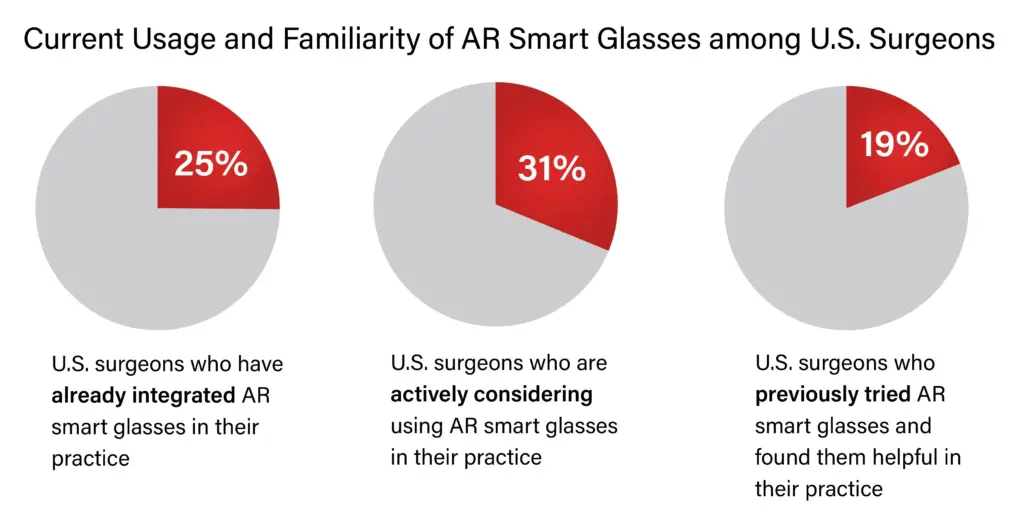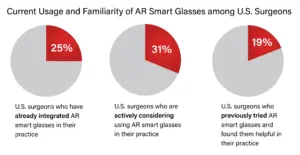A recent report commissioned by Vuzix, surveyed over 500 surgeons across the United States, and suggests growing interest and adoption of augmented reality (AR) smart glasses in surgical practices. This is a report from a company that wants to sell AR glasses to surgeons so, take that how you will. The proviso is that the report was conducted by a third-party research firm, Censuswide. Fieldwork was undertaken between May 3rd – May 5th, 2023. It may be hard to translate these findings into a general overview of the size of the market for AR in the operating room, but even if the sample size was surgeons willing to talk about AR then, at least, it provides some interesting perspective.
The report reveals that 25% of surgeons have already incorporated AR smart glasses into their workflows, while an additional 31% are actively considering their utilization. This indicates a strong appetite among surgeons for integrating AR technology into their daily routines, emphasizing their optimistic outlook on the future of AR in medicine.

The report also provides insights into regional variations in the adoption of AR smart glasses among surgeons. The South region leads with 27% of surgeons currently using AR smart glasses in their practice, followed closely by the Midwest and Northeast regions, both at 26%. The West region shows a slightly lower adoption rate, with 21% of surgeons currently utilizing AR smart glasses. Furthermore, the report reveals the benefits experienced by surgeons from the usage of AR technology, with percentages varying across regions. In the South, 23% of surgeons reported past benefits, while in the Midwest and Northeast, the figures were 14% and 19% respectively. The West region had 18% of surgeons reporting past benefits.
The Challenges of AR in the Operating Room
However, there are always concerns with AR among doctors. For smart glasses to be viable in the operating room, they need to be lightweight, comfortable, and not impose cognitive burden during extended periods of use. Surveyed surgeons raised concerns regarding challenges with the interface (29%), the learning curve for initial setup configuration (29%), battery life lasting through long surgeries (28%), and sensory overload (25%). The wearability of additional equipment, such as smart glasses, becomes a primary concern for surveyed surgeons, with 33% expressing this concern.
Which Doctors Use AR Most
In terms of current utilization of AR smart glasses, cardiovascular surgery leads the way with 47% of surgeons incorporating this technology into their procedures. Following closely are podiatric surgery, general surgery, neurosurgery, oral and maxillofacial surgery, and cardiothoracic surgery, with adoption rates of 34%, 34%, 34%, 32%, and 30% respectively.
When considering the use of AR smart glasses, plastic surgeons show the highest interest at 42%, closely followed by transplant surgery at 41%. Other specialties expressing interest include orthopedic surgery (39%), hand surgery (37%), and neurosurgery (34%).
Among surgeons who have used AR smart glasses in the past and found them helpful, oral and maxillofacial surgery tops the list with 29% reporting positive experiences. Following closely are ophthalmic surgery (27%), bariatric surgery (27%), obstetric and gynecologic surgery (25%), and surgical oncology (23%).

